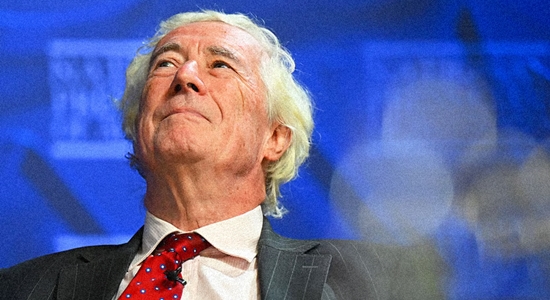
Jonathan Sumption says that in Hong Kong, the rule of law “is profoundly compromised in any area about which the government feels strongly.” Which is a lot of areas.
In our post of June 7, 2024, we noted that two British judges serving in Hong Kong had resigned in the wake of a decision to convict 14 Hongkongers of “subversion” for participating in an unofficial primary election a few years ago. (A Canadian judge, Beverley McLachlin, has also now left the Hong Kong judicial system—to “spend more time with my family.”)
One of the two British judges throwing in the towel, Lord Lawrence Collins, was muddled in his explanation of why he was stepping down from the Court of Final Appeal. The other, Lord Jonathan Sumption (shown above), said that his explanation would be forthcoming.
Grave danger
The explanation arrived a few days later in the form of commentary for the Financial Times (“The rule of law in Hong Kong is in grave danger,” June 10, 2024).
Sumption is not entirely clearheaded either. He says that although the May 30 decision of the High Court to convict 14 pro-democracy politicians of “conspiracy to commit subversion” is legally indefensible—in part because it accepts the criminalization of “an express constitutional right for a purpose unwelcome to the government”—the atrociousness of this decision “does not necessarily mean that the rule of law is dead.”
The appeal courts may yet put it right. The real problem is that the decision is symptomatic of a growing malaise in the Hong Kong judiciary. Hong Kong’s judges have been threatened with sanctions in the US, an idea that is crude, counterproductive and unjust. Most of them are honourable people with all the liberal instincts of the common law. But they have to operate in an impossible political environment created by China.
Their first problem is the terms of the National Security Law and a hitherto defunct colonial law against sedition. This illiberal legislation does not entirely curtail the judges’ freedom of action but it severely limits it. Judges have to apply the law.
No, in fact, judges do not “have to” apply “the law” when “the law” instructs them to ignore the law, i.e., the law that should be determinative, which in the case of the exercise of democracy by the convicted 14 pro-democracy politicians is the “express constitutional right” to act as legislators when legislators and, as candidates, to say what legislation they’ll push for if elected.
But what if there were no statutes and no constitutional provisions with which to contradict bad “law”? If “the law” as imposed by the CCP were to say that jaywalkers must be imprisoned or executed for jaywalking, and any allusions to rights, justice, and proportionality had been stricken from the books, would judges have no choice but to sigh heavily and impose such a sentence on jaywalkers?
Judges are not obliged to impose punishments that no moral and rational person would ever impose. Not even if it’s “their job” to do so.
Sumption sees what is happening in Hong Kong and its courts to this extent:
Intimidated or convinced by the darkening political mood, many judges have lost sight of their traditional role as defenders of the liberty of the subject, even when the law allows it. There are guarantees of freedom of speech and assembly in both the Basic Law and the National Security Law, but only lip service is ever paid to them. The least sign of dissent is treated as a call for revolution. Hefty jail sentences are dished out to people publishing “disloyal” cartoon books for children, or singing pro-democracy songs, or organising silent vigils for the victims of Tiananmen Square.
Hong Kong, once a vibrant and politically diverse community is slowly becoming a totalitarian state.
If the CCP has not yet acted to explicitly rescind recorded guarantees of freedom of speech and assembly but acts to prohibit and punish many supposedly protected acts of speech and assembly, the situation is just as if it those provisions had in fact been formally rescinded and were citable no more.
Either way, the choice faced by judges is the same: serve the Chinese Communist Party and ignore justice or serve justice and ignore the Party.
Disobey
What should a judge do when confronted with an “impossible political environment,” when confronted with dictates by the Chinese Communist Party to destroy the lives of innocent persons who come before the court?
What an “honourable person with all the liberal instincts of the common law” does is disobey. Disobey. Not cooperate. If refusing to succumb to pressure to do evil while working as a judge in the Hong Kong judicial system becomes impossible, pointless, or the equivalent of putting a gun to one’s head, the only thing to do is resign, as Sumption finally has done.
Sumption “had remained on the court in the hope that the presence of overseas judges would help sustain the rule of law. I fear that this is no longer realistic. Others are less pessimistic. I hope that they are proved right.”





